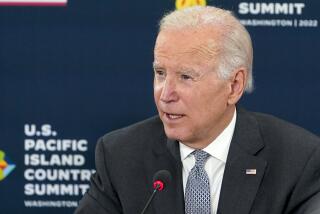Dawn of Pacific Century Finds U.S. Sitting on Its Status
When President Bush leaves next week on his journey to Asia, he will be establishing important priorities for American diplomacy in the years ahead. By responding imaginatively to the economic and security challenges confronting American interests in Asia, Washington policy-makers can do much to advance our interests in the coming Pacific Century.
The challenge for the generation ahead seems clear.As progress is made on stabilizing U.S.-Soviet nuclear deterrence at lower levels of force, the relative economic strength of nations will emerge as a fundamental determinant of national power. Yet we are stumbling in our efforts to keep up with our friends and former adversaries in the Pacific. We are falling behind at the dawn of an era in which trade issues and military deployments are likely to prove even more divisive. To avoid such pitfalls and to realize our extraordinary opportunities on the Pacific Rim, we need new initiatives.
The region is undergoing a radical transformation. Soviet diplomacy is aggressively pursuing new openings--not just in Beijing, where the first Sino-Soviet summit in a generation will be held this May--but throughout East Asia. A new generation of Korean leaders is questioning the lessons of history and expanding economic relations with former enemies. China is struggling forward with economic change that promises to double its gross national product in less than one decade. Japan is awash in capital, working hard to assume new security and diplomatic responsibilities while trying to remain sensitive to neighbors’ concerns about its expanding military prowess. Virtually throughout East Asia an unparalleled economic boom is bringing prosperity unimaginable a generation ago. But this is also straining relations with the United Statesas many of our businesses and workers suffer from the enormous trade deficit.
A set of priorities needs to be established for our Pacific agenda:
Diplomatic initiatives . The United States should take the lead in establishing a Pacific Basin Forum to pursue co-operation on regional economic and security concerns.This proposal should include the establishment of annual summit-level meetings styled after those currently held by key presidents and prime ministers within the Atlantic alliance. The forum should also make a deliberate effort to reach out to the Soviets and their allies, Vietnam and North Korea, to encourage participation in a dialogue about such common concerns as free trade, economic development and security confidence-building.
Trade and investment policy . While rejecting sweeping protectionist measures, we need to ensure that we’re not unilaterally disarming in trade competition. We should commit to taking swift and certain retaliation when foreign trading partners refuse to provide reciprocal treatment for U.S. agricultural products, manufactured goods and financial services.
To create new export opportunities, we also need a major new commitment to educating our work force about foreign markets and foreign languages. George Bush pledged to be “the education President.” He can fulfill that commitment by joining Congress in a war on ignorance--shaping new efforts to improve American training in mathematics, geography, science and foreign languages.
To enhance trade competitiveness, we also need new initiatives to curb defense spending and cut capital-gains taxes (the U.S. rate is 33%, compared with 5% in Japan). That’s how we can free up public and private resources for investment in the production of commercial goods. Security policy . There are five clear imperatives for the shapers of American military policy in the Pacific:
--Pursue negotiations with Manila for at least a 10-year renewal of the lease on our vital facilities at Subic Bay and Clark Air Base. Failure could result in a $10-billion re-location cost and a sharp setback for Philippine-U.S. ties.
--Press the Japanese to pay more of the on-the-ground costs for the American forces in Japan that enhance regional security. But discourage Japan from assuming ever broader military missions. Japan has already “re-armed,” and is now making substantial contributions to regional security and economic development.
--Continue to provide selected defensive arms to both China and the authorities on Taiwan, sales that can help to reduce the possibility of a rash military confrontation.
--Oppose pressures for premature U.S. troop withdrawals from South Korea, an action that must await progress in direct north-south talks.
--Continue in all our diplomatic and military efforts to champion human rights and the rule of the law. Experience clearly demonstrates that this is not simply a moral obligation but a strategic imperative as well. Democratic allies are more stable, more prosperous and more reliable than dictatorships.
The successful implementation of each of these initiatives could enhance American interests in the Pacific for generations to come. But if we fail, if we sit back and become a status quo power ignoring the sweeping changes taking place throughout the region, we will have only our-selves to blame.
More to Read
Sign up for Essential California
The most important California stories and recommendations in your inbox every morning.
You may occasionally receive promotional content from the Los Angeles Times.










